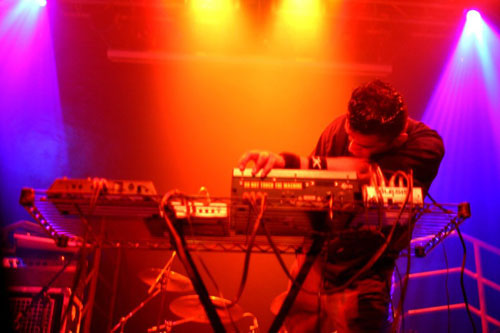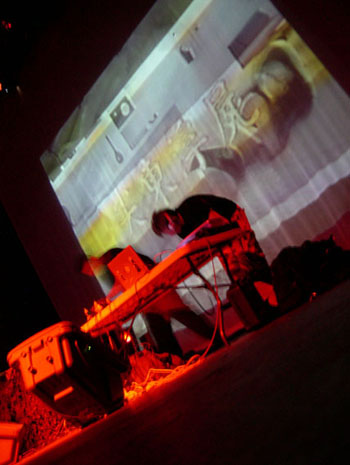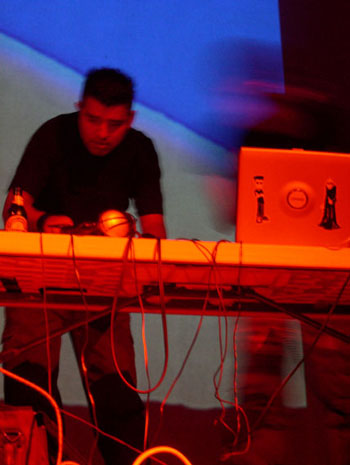
From misplaced accusations of fascism and misogyny to nightclub altercations that generate all manner of Internet rumors, Manufactura creator Karloz M. is one of the most controversial figures in the modern rhythmic noise scene.
Manufactura’s music is intertwined with violence, but unlike the militaristic imagery of many of his fellow artists, Karloz M. explores violence from an intensely personal level that no doubt adds to the controversy. By dealing with the uglier side of human nature from such a close perspective, there’s something inherently more confrontational about his music. You can’t dance to a Manufactura track and then forget about it; it’s more disturbing than your typical four-on-the-floor beat laced with war movie samples. There’s a lot more to Manufactura than aggression, though, and on Manufactura’s latest CD “In The Company of Wolves”, a collection of remixes and collaborations, some of the most chilling moments are the quietest.
How are you doing Karloz?
I’m alright, I’m living through all of it, just like everyone else is or has. Where are you from originally?
I reside in the United States but I was born in Colombia, South America. Since then I have been in constant motion from one place to another never staying in one place for more than a few years at a time, mostly due to my loss of interest for any one city or time frame. I probably don’t belong anywhere per say. I’m a gypsy.
Do you think the constant change in locale serves to inspire or influence your musical works? I know the constant relocation of studio gear has to be a pain to say the least.
I never really though about it, but yes I think perhaps it does. In much the same way traveling musicians or gypsies use their experiences to create stories or songs. I don’t do it consciously but I do suppose that at a subconscious level it has to have a great influence on my work as it does in my life. As for gear, a studio and such, yes the simple act of relocating, reassembling and rebuilding a creative space for me to work in has been both painful yet cathartic. It’s a way of cleansing the mind and spirit.
How do you occupy your free time?
I meditate. I think too much for my own good. I devour the poetic words and music of mad men and mad women. I stare at the distance looking for answers to questions I know have no meaning. I write. I live in the moment because we’re all dying from the illness of time.
The mad tend to always have the most to say it seems and the method of conveyance makes it all the more interesting. I know you are a huge fan of Bukowski and David Lynch. Any other favorites in the realm of prose and film? What do you think makes a great writer or film maker?
My main inspirations do come from literature and film. I’m not really sure why but perhaps it’s because they stir my imagination the most. Leonard Cohen, Jim Carroll, Anne Sexton and Lou Reed are amongst the top of my list of poets that simply do it for me each and every time. Their work like Bukowski’s cuts right down to the bone and to the matter of it all. It’s raw and its beautiful and they all focus on my favorite subject of all, the flawed human beings, lost souls. While Peter Greenaway and Darren Aronofsky are on the top f my favorite directors and they like Lynch paint the most brilliant, dark, emotionally moving landscapes on film. Watching their work is something of a spiritual moment for me, I actually feel blessed when I can witness their new work and I always feel different after having seen it. It’s a strange and difficult feeling to explain. I think being honest and sincere is what makes a great writer, film maker or artists for that matter. None of these artists or writers are the big blockbuster selling machines, or the most popular, they are somewhat over looked, successful in their own right but yet still maintain their individuality close to their vest and that’s what makes them unique, intriguing and original.
How would you define your style?
I can’t define it. I write electronic music, somewhat dark, perhaps disturbing at times, melancholy, meditative, a bit strange and some have said powerful. It’s up to the listener and what they are listening to, or are hearing at the time. I’m all over the place style wise because I must have variety in the art form. I just don’t like to write like other people do and pump out the same thing over and over. I suppose that’s what you have to do if you want to sell records and fill dance floors. I do what I like, if it sells or people dance to it fine, if not….then whatever.
 When you write a song do you set out with intended tones/sounds in mind or do you allow the song to evolve as your write it? Does this depend on the project?
When you write a song do you set out with intended tones/sounds in mind or do you allow the song to evolve as your write it? Does this depend on the project?
It does depend on the project and on the track itself. I might have lyrics first that need to be scored or sounds that need to be molded into something I can convey as feeling, whether it be anger, rage, sadness or madness. Many times I’ll dream of a song or a track and have to write it as soon as I wake. Other times I’ll go without sleeping until the thoughts in my head have exhausted themselves. I try not to force it, it has to come naturally or it won’t mean much to me. Other times a song or a track will sit in the studio untouched for years before it’s given the chance to actually breathe. It all depends in the moment. I live for those moments.
How long have you been creating electronic music? Are you classically trained or self taught?
I started experimenting in with tape decks and a microphone in 97/98, I bought a computer shortly after I had some major surgery that caused me to lose 25% of my hearing. I had done some theatre work as a young man and that was my extent of any type of work with music. I basically started to work on music out of fear of losing my hearing completely, as the doctors told me it would only be a matter of time. I’m self-taught and I just do what I like and what I think sounds good to me. I’ve been fortunate some people find some kind of worth in what I do.
If you don’t mind me asking, what was the source of the hearing loss?
When I was a young boy I went swimming in a lake and apparently the water had some kind of bacteria that ate away my eardrum. I had to have open head surgery to have my eardrum reconstructed. Since then I have always had problems with my ears. Finally as an adult it all came to ahead one afternoon when I had to go to the emergency room and they told me that if I didn’t have surgery with in the next 48 hours I would die. Apparently there was some kind of tumor that had been growing between my ear and my brain for over a decade undetected and it was ready to explode. Once again I had to have open head surgery to have it removed and have my ear cavity reconstructed. I was told there was a 50/50 chance I would end up with complete hearing loss and a paralyzed face. At the time I was only experimenting with music and ignored a few friends who said I should pursue it. The night of the surgery I promised myself that if I got out of the hospital with at least some hearing left I would dedicate my time to music completely.
Classic question but it has to be asked, where do the names for your various projects come from?
“Manufactura” came from the back of a box of rat poison that looked like a box of cereal for children. “Broken Fabiola” came from the thought of angelic beauty that hides the devil within. “Stranger Dreams” came from my life long history of fucked up and twisted dreams. “Industria Secundaria” came from the thought of the world and everything in it being raped to death by the industry of man.
I noticed that you released the spoken word, “Stranger Dreams” and “Industria Secundaria” all online via Reverbnation. What was the cause of the swift release of all three free download albums? I have to admit i loved all the side projects but “Industria Secundaria” was the one on repeat on my computer. The samples for it fit perfectly with the gritty distorted percussion.
I’m always writing and I sometimes go into a state of constant continuous writing for days and days and to this day I have hard drives of stuff just sitting around waiting for the right time or day or movement of the moon or what have you. I had been working on “Stranger Dreams” for quite a long time and some of that material was written years ago in Seattle, as well as the “Industria Secundaria” material. I know that I’ve been called prolific in the past but I never thought so, however 2008 was my most productive year to date. I don’t know why I just felt compelled to put these projects out. I had already released work from the spoken word material years earlier so that work was a new EP of sorts. I guess I just said if I didn’t do it then I might never do it again. I’ve wanted to share those ideas with people and so finally I just did it and I felt much better for it. That same year not only did I release new music for all my projects but a double disc for Manufactura as well. I’m not sure what came over me but I’m glad it did.
Also what was the inspiration for “As They Drown In Their Lies”?
The concept of the album has to do with the love affair the world has with lies and deceit. Nobody gives a fucking shit anymore. Everyone has become accustomed to lying and being lied to. At the heart of the matter everyone subconsciously knows the world is fucked up, everyone understands the world in general is nothing but a fucking lie. Yet we’ve all become desensitized to it. We’re being told and sold on lies the minute the sun rises till the second it sets again, over and over, repeatedly like a fucking machine. We are all fighting wars based on lies. Your government is lying to you, your family is lying to you, your friends are lying to you, your lover is lying to you, and worst of all you’re lying to yourself. In a very short amount of time there will be 7 billion people on this earth, most of them being subjected to the cruelty and lies of the controlling minority. We are all well aware of the damage we as human beings subject one another to but does any one really give a fuck? Is anyone really doing anything of significance to fucking change any of it? Absolutely not, history has taught us nothing if only that fact alone. We are not evolving as civilized human beings because we never were civilized to begin with. We’re all drowning in it my friend, every single one of us. The truth is the lie.
I noticed on the disc that a lot of the material is paying tribute to other artists (Lou Reed, Bukowski etc). What was the intent behind this? Also I noticed a few collabs with other artists which is unusual for you outside of “In the Company of Wolves”. Any specific reason for the guests?
I spend a lot of time reading the works of the poets I had mentioned earlier. They help me in someway to cope with my day-to-day life and reality. I feel as though they are part of my life and I guess having spent so much time alone with the words of these great artists I felt I had to honor them somehow in my own way. As for the collaborative work on the album I just wanted to try something a little different. Having done a few collaborative works before I really enjoyed the process of bouncing ideas with other artists so I thought it would be a great idea for the new album. I try to work with musicians and artists that I feel have their own unique voice and yet are also innovative and not painting themselves into some corner with any specific sound or idea. I also like to work in what I like to call a free-flow environment I don’t like to force too much into the music so it can stay raw and remain as real to the source, anyone that I work with has to be open minded to that idea. I was lucky that it did work out that way with these talented artists.
What does your studio setup consist of? Do you prefer hardware or software for production?
My set up is whatever my situation calls for. Being on the go so often I do most of my recording through an old junky laptop. I borrow and use old and busted keyboards and/or whatever gear I can get my hands on and squeeze it for raindrops of magic. I prefer to play through hardware and record and mix through software. Again it just depends on where and what I’m doing. I also like to do field and found sound recording to edit and design just for fun. Several tracks from the new album were recorded in a dirty warehouse by some train tracks in the dingy part of the Los Angeles valley, while a few other parts were worked in dirty Detroit and some in Miami. Every situation calls for different techniques.
What is some gear you are looking to acquire or wish to include in your setup?
I’d like to get my hands on a basic guitar and a bass guitar again. Unfortunately I had to get rid of my 2 rinky-dink guitars so I’m out of those right now. In reality I need to get new gear in general that actually works properly. I don’t know, I try not to get too involved with gear since it just comes and goes. I’m already losing my hearing more significantly this year alone so who knows how long I have before it all goes to shit. For many years now, I have adopted the motto of “do the best that you can with what little you have”. My most important piece of equipment is my brain, and that too has seen its fair share of damage.
 How did you come to be in contact with Crunch Pod and Tympanik?
How did you come to be in contact with Crunch Pod and Tympanik?
For my second album, I was on the now defunct label called “Hive Records” that was run to the ground by its ‘owner’, Davyd Pittman. He basically took a shit on a good number of his artists, never paying me royalties due, nor treating several of the acts on that label with any form of respect. Naturally I decided to leave that fucking mess. I had known of Crunch Pod for some time as a distributor and CDR label. I had known the owner, Ben Arp and heard that he was looking to branch out into fully pressed CD’s and establishing it as solid label. I met Ben at a coffee shop in Seattle and we basically hammered out a simple plan. That was back in 2005 today I’m very proud of the work Crunch Pod has done over all while establishing itself internationally as a unique and innovative label, considering we are a DYI label and didn’t have the resources other labels in this scene have had. As for Tympanik, I sent Paul a demo, he sent me a contract and we released the album.
What are some highlights for you from past tours and records? Also what do you think makes a great live show?
Wow, well that’s kind of a tough one after having done well over 300 shows, 5 completely different tours and a bunch of special engagements. I guess for me some of the highlights have been just being able to perform and to engage a crowd that’s truly interested in the music and not the fashion or the politics of the genre etc, etc. I have made lifelong friends, I have laughed, loved, fought and bled on the road so many times, it’s difficult to pin point particular experiences. I guess being able to perform with very talented artists such as Dirk Ivens, Daniel Myer, Charles Levi, Scott Sturgis, Chris Randall, Tom Shear, Erk Aicrag, Ben DeWalt, Dre Robinson, Shane Talada, etc. I could be here all day listing all the amazing people I’ve been fortunate enough to have worked with throughout the years. As for the records it becomes difficult to single any of them out, it’s very true what they say about albums being almost like your children and the difficulty in picking one over another. Each one for them has a very special place in my heart and it represents different lives and times and places for me. I suppose the first album to me has a very special meaning not because of the music per say but because it was the catalyst to everything that’s happened since it was released. And to answer your question about a great show it has to do with SOUL A great show to me is where the artist is willing and capable of bearing and sharing their soul honestly with the audience regardless of how it’s done.
Any plans for future side projects (Stranger Dreams, Industria Secundaria, etc) or future releases?
So long as I can at least hear from one ear I will try to put out and share my interpretation of music in whatever form that happens to be. I’m very excited to be working with some awesome ad talented female vocalist such as Brittany Bindrim of I:Scintilla, Sharon Blackstone and Nissa for the next full album for Broken Fabiola. As for my other projects, I would love to continue on with Stranger Dreams but due to my lack of gear at the moment, that project will be put on the back burner for now. I do have a spoken word project that I still like to dabble with from time to time so that might see a release in the near future. I’m always writing and always working on music, I just never know what project will demand my attention at any given moment. As I said before it’s all about those moments.
How did you originally get in contact with Bindrim and Blackstone?
After having worked with the amazing Nissa in Seattle, I was looking for someone to record with in Los Angeles. I meet Sharon Blackstone in L.A. through mutual friends and in turn we became close friends. I found out that she had worked as a vocalist for the band “Diva Destruction” so I asked her if she would be interested in working with me on some recordings. I got to know Brittany Bindrim who is the lead singer for the band “I:Scintilla” when her band asked me for a remix a few years ago, I really loved her voice and so I asked her if she would be interested in working on a few songs with me. I have always been a fan of great female voices and I feel very fortunate to have worked with Nissa, Sharon and Brittany. I have always said that when it comes to music women have the best melodies while men have the best rhythms, I think that’s just the law of nature.
Any tips for the musicians out there?
Be fucking real. Don’t write music as a fucking fashion statement. Don’t put out empty hollow material you’re going to regret 5 or 10 years from now. I have seen this time and time again within and outside this small scene. Write what you know. For those of you that prefer writing Electro-Industrial music, just be honest with yourself. There’s already enough VNV Nations & Combichrists out there, we don’t need any more Divas. Less is more. Write with honest conviction. Don’t pander or cater to the “Das Bullshit” disco tech clubs because they too will come and go by the dozen, as they always have, as they always will. Be careful of dishonest record labels and their worthless contracts. And just to drive this point home… Be fucking real.
Relevant links
Manufactura @ Crunch Pod
Manufactura @ MySpace
Broken fabiola @ MySpace
— interview by James Church (May 2010)
